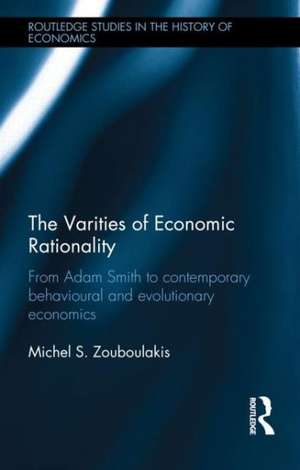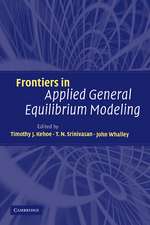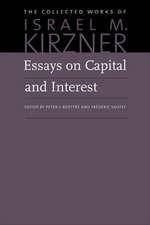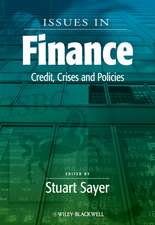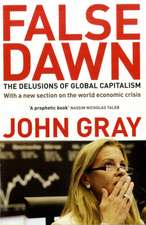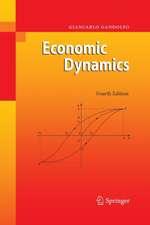The Varieties of Economic Rationality: From Adam Smith to Contemporary Behavioural and Evolutionary Economics: Routledge Studies in the History of Economics, cartea 160
Autor Michel Zouboulakisen Limba Engleză Hardback – 20 ian 2014
The book charts this history in order to reveal important instances of conceptual transformation of the meaning of economic rationality. In doing so, it presents a uniquely detailed study of the historical change of the many faces of the homo oeconomicus .
Din seria Routledge Studies in the History of Economics
-
 Preț: 378.26 lei
Preț: 378.26 lei -
 Preț: 316.51 lei
Preț: 316.51 lei -
 Preț: 302.55 lei
Preț: 302.55 lei - 9%
 Preț: 1003.12 lei
Preț: 1003.12 lei -
 Preț: 324.46 lei
Preț: 324.46 lei -
 Preț: 311.28 lei
Preț: 311.28 lei -
 Preț: 326.99 lei
Preț: 326.99 lei -
 Preț: 326.82 lei
Preț: 326.82 lei -
 Preț: 665.69 lei
Preț: 665.69 lei - 9%
 Preț: 935.40 lei
Preț: 935.40 lei -
 Preț: 395.82 lei
Preț: 395.82 lei -
 Preț: 280.74 lei
Preț: 280.74 lei -
 Preț: 318.31 lei
Preț: 318.31 lei -
 Preț: 392.72 lei
Preț: 392.72 lei - 8%
 Preț: 392.82 lei
Preț: 392.82 lei -
 Preț: 310.43 lei
Preț: 310.43 lei -
 Preț: 214.15 lei
Preț: 214.15 lei -
 Preț: 399.71 lei
Preț: 399.71 lei -
 Preț: 157.37 lei
Preț: 157.37 lei - 26%
 Preț: 850.91 lei
Preț: 850.91 lei - 27%
 Preț: 995.39 lei
Preț: 995.39 lei - 18%
 Preț: 1005.04 lei
Preț: 1005.04 lei - 18%
 Preț: 1002.60 lei
Preț: 1002.60 lei - 28%
 Preț: 1046.46 lei
Preț: 1046.46 lei - 18%
 Preț: 1280.31 lei
Preț: 1280.31 lei - 18%
 Preț: 1055.51 lei
Preț: 1055.51 lei - 18%
 Preț: 1055.51 lei
Preț: 1055.51 lei - 28%
 Preț: 987.72 lei
Preț: 987.72 lei - 25%
 Preț: 824.17 lei
Preț: 824.17 lei - 18%
 Preț: 1061.93 lei
Preț: 1061.93 lei - 18%
 Preț: 716.32 lei
Preț: 716.32 lei - 18%
 Preț: 1006.07 lei
Preț: 1006.07 lei - 18%
 Preț: 1069.92 lei
Preț: 1069.92 lei - 12%
 Preț: 342.67 lei
Preț: 342.67 lei - 18%
 Preț: 1056.00 lei
Preț: 1056.00 lei - 28%
 Preț: 991.34 lei
Preț: 991.34 lei - 18%
 Preț: 1076.53 lei
Preț: 1076.53 lei - 18%
 Preț: 698.08 lei
Preț: 698.08 lei - 22%
 Preț: 332.02 lei
Preț: 332.02 lei - 18%
 Preț: 1169.78 lei
Preț: 1169.78 lei - 18%
 Preț: 1059.84 lei
Preț: 1059.84 lei - 30%
 Preț: 852.88 lei
Preț: 852.88 lei - 25%
 Preț: 830.10 lei
Preț: 830.10 lei - 18%
 Preț: 1119.93 lei
Preț: 1119.93 lei - 18%
 Preț: 1062.98 lei
Preț: 1062.98 lei - 18%
 Preț: 953.01 lei
Preț: 953.01 lei
Preț: 372.58 lei
Nou
Puncte Express: 559
Preț estimativ în valută:
71.30€ • 74.17$ • 58.86£
71.30€ • 74.17$ • 58.86£
Carte tipărită la comandă
Livrare economică 15-29 aprilie
Preluare comenzi: 021 569.72.76
Specificații
ISBN-13: 9780415530842
ISBN-10: 0415530849
Pagini: 192
Dimensiuni: 138 x 216 x 15 mm
Greutate: 0.52 kg
Ediția:1
Editura: Taylor & Francis
Colecția Routledge
Seria Routledge Studies in the History of Economics
Locul publicării:Oxford, United Kingdom
ISBN-10: 0415530849
Pagini: 192
Dimensiuni: 138 x 216 x 15 mm
Greutate: 0.52 kg
Ediția:1
Editura: Taylor & Francis
Colecția Routledge
Seria Routledge Studies in the History of Economics
Locul publicării:Oxford, United Kingdom
Public țintă
Postgraduate and UndergraduateCuprins
Introduction: Why is rationality so important to economists? 1: Adam Smith and the concept of morally constrained rationality 2: John Stuart Mill and the concept of socially embedded rationality 3: William Stanley Jevons and the concept of substantive rationality 4: Vilfredo Pareto and the idea of rationality as consistency of choices 5: Lionel Robbins, scarcity, consistency and rationality 6: Neoclassical rationality under fire: the empiricist critique 7: Three conventionalist responses. Machlup, Samuelson and Friedman 8: Popper’s conventionalist retreat 9: Game theory introduces strategic rationality 10: Herbert Simon and the concept of bounded rationality 11: Rationality in behavioral economics 12: The social individuals’ rationality Conclusion: Who is rational after all?
Descriere
This book traces the historical evolution of the concept of economic rationality from Adam Smith to the present, revealing how this concept has in fact changed over time. In doing so, it presents a uniquely detailed study of the historical change of the many faces of the homo oeconomicus.
